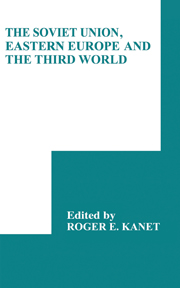Book contents
- Frontmatter
- Contents
- List of figures
- List of tables
- List of contributors
- Foreword by R.C. Elwood
- Preface by Roger E. Kanet
- PART 1 THE THIRD WORLD IN SOVIET FOREIGN POLICY
- PART 2 CMEA ECONOMIC INVOLVEMENT IN THE THIRD WORLD
- PART 3 THE SOVIET UNION IN THE MIDDLE EAST AND SOUTH ASIA
- Index
- Publications from the Third World Congress for Soviet and East European Studies, Washington, 1985
Preface by Roger E. Kanet
Published online by Cambridge University Press: 06 July 2010
- Frontmatter
- Contents
- List of figures
- List of tables
- List of contributors
- Foreword by R.C. Elwood
- Preface by Roger E. Kanet
- PART 1 THE THIRD WORLD IN SOVIET FOREIGN POLICY
- PART 2 CMEA ECONOMIC INVOLVEMENT IN THE THIRD WORLD
- PART 3 THE SOVIET UNION IN THE MIDDLE EAST AND SOUTH ASIA
- Index
- Publications from the Third World Congress for Soviet and East European Studies, Washington, 1985
Summary
Soviet policy toward the countries of Asia, Africa and Latin America has undergone substantial expansion and change during the three decades since Khrushchev first initiated efforts to break out of the international isolation in which the USSR still found itself in the immediate post-Stalin years. Over the course of the past thirty years the Soviets have expanded significantly both the geographic range of their involvement with developing countries and the intensity of their political, military and economic activities. Moreover, they have increasingly acted in consort with “allies” such as Cuba and the countries of Eastern Europe. The studies included in the present volume examine various aspects of recent Soviet and East European policy toward the Third World.
The five chapters in Part I deal with broad aspects of Soviet policy. In the first chapter Roger Kanet examines the major trends in Soviet policy over the past thirty years. Elizabeth Kridl Valkenier is concerned especially with recent Soviet reassessments of both the nature of and prospects for revolutionary change in the developing countries, while Mark N. Katz discusses the problems faced by the Soviets in their support for “client” states currently confronted by internal insurgencies. In the two final chapters in Part I Paul Roth and Roger Kanet examine aspects of Soviet information and propaganda policy. While Roth notes the Soviet use of the concept of a New World Information Order to try to control Western news and information media, Kanet deals with the place of propaganda in Soviet policy in the Third World.
- Type
- Chapter
- Information
- The Soviet Union, Eastern Europe and the Third World , pp. xv - xviPublisher: Cambridge University PressPrint publication year: 1988



